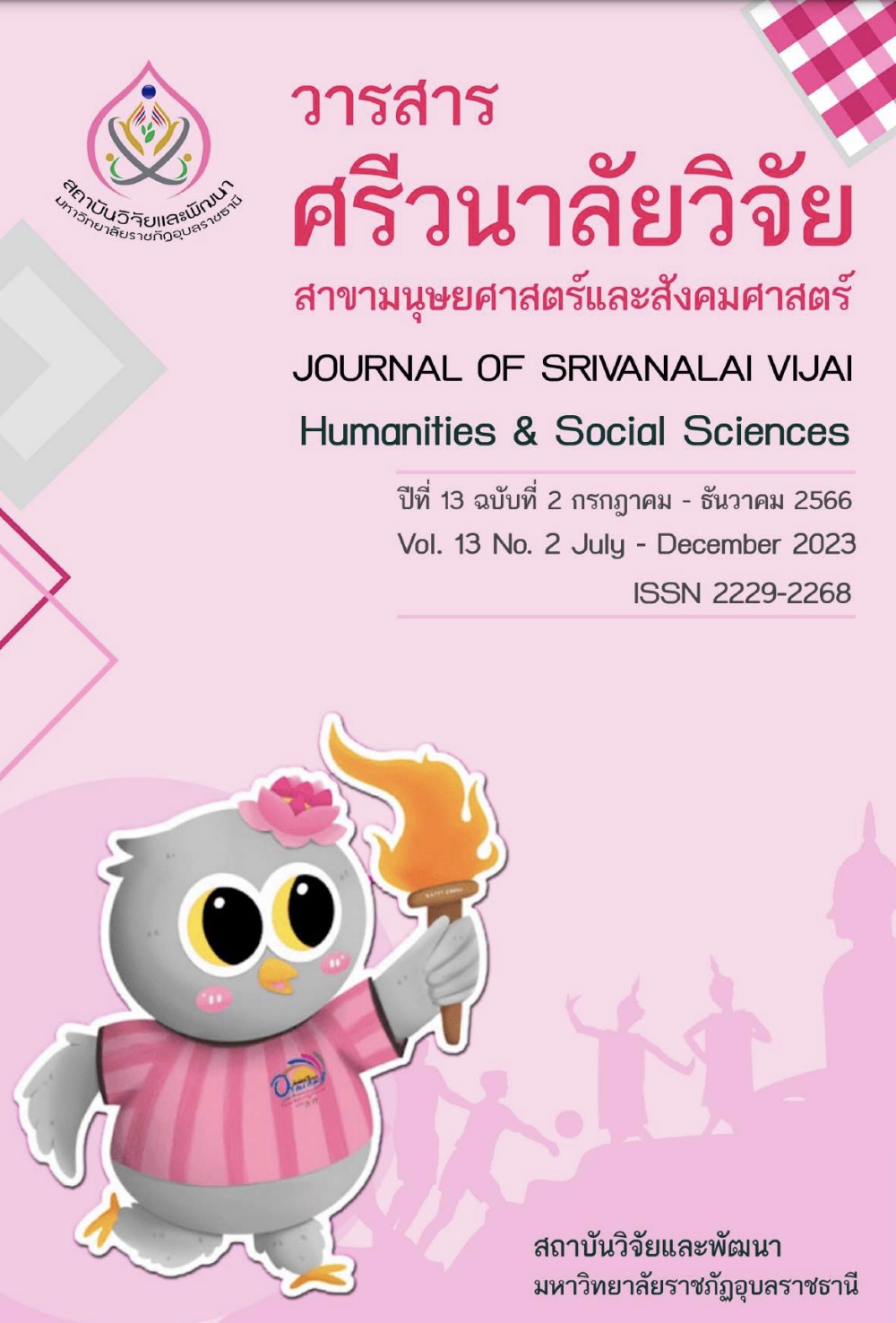ทักษะในอนาคตที่พึงประสงค์สำหรับเลขานุการทางการแพทย์
Main Article Content
บทคัดย่อ
บทความนี้มีวัตถุประสงค์เพื่อศึกษาทักษะในอนาคตที่พึงประสงค์สำหรับเลขานุการทางการแพทย์เพื่อ
เป็นแนวทางในการพัฒนาทักษะให้ทันต่อการเปลี่ยนแปลงของโลกในอนาคตเพื่อตอบสนองความต้องการการ
ขยายตัว Medical Hub โดยการทบทวนวรรณกรรมที่เกี่ยวข้อง เพื่อหาความรู้เบื้องต้นเกี่ยวกับเลขานุการทาง
การแพทย์ บทบาทหน้าที่ คุณลักษณะ สมรรถณะ และทักษะในอนาคตของเลขานุการทางการแพทย์ พบว่า ทักษะ
ในอนาคตที่เลขานุการทางการแพทย์ควรมี แบ่งได้เป็น 6 กลุ่มได้แก่ 1) ด้านวิชาการ ประกอบด้วย ความรู้ทางด้าน
สุขภาพ การสื่อสารภาษาอังกฤษทางการแพทย์ สถิติและการวิจัย 2) ด้านความคิด ซึ่งประกอบด้วย การคิดอย่างมี
วิจารณญาณ การคิดอย่างสร้างสรรค์ 2) ด้านการพัฒนาตนเอง ประกอบด้วย มุ่งมั่นพัฒนาตนเอง สะสมความ
เชี่ยวชาญ 3) ด้านเทคโนโลยี และการสื่อสาร ประกอบด้วย การใช้สารสนเทศ การใช้ดิจิทัล 4) ด้านความสัมพันธ์
ประกอบด้วย การทำงานเป็นทีม เข้าใจความแตกต่างทางวัฒนธรรม ด้านการสื่อสาร 5) ความสามารถในการ
ปรับตัว ประกอบด้วย การแก้ปัญหาเฉพาะหน้า ความคล่องตัว 6) ด้านการเป็นผู้นำและการเป็นพลเมืองที่ดี
ประกอบด้วย การเป็นผู้นำ การเป็นพลเมืองที่ดี 7) ด้านความมีศีลธรรมจรรยา ประกอบด้วย ความชื่อสัตย์ มีความ
เสียสละ รักษาความลับขององค์กร 8) การประสานงาน ประกอบด้วย การเจรจาต่อรอง และการติดตามงาน ซึ่ง
ทักษะเหล่านี้จะส่งเสริมให้เลขานุการทางการแพทย์มีศักยภาพในการปฏิบัติงานเป็นที่ต้องการของโรงพยาบาลและ
องค์กรต่างๆ ซึ่งสามารถปรับตัวให้ทันต่อสถานการณ์ เหตุการณ์ที่เปลี่ยนแปลง และรองรับการเติบโตของ Medical
Hub
Article Details
เอกสารอ้างอิง
กระทรวงศึกษาธิการ, (2564). รายงาน ทักษะที่จำเป็นแห่งอนาคต (Future Skill) เพื่อเตรียมการพัฒนาคุณภาพ
คนไทยทุกช่วงวัย รองรับการเปลี่ยนแปลงอย่างรวดเร็ว (Disruption) ของโลกศตวรรษที่ 21 : ผล
การศึกษาแนะแนวทางการส่งเสริม. สืบค้นเมื่อ 24 กันยายน 2566, สำนักงานสภาพัฒนาการ
เศรษฐกิจและสังคมแห่งชาติ (สศช.): https://shorturl.asia/5Xymt
ณัจนา ปรัชญานนท์ และพัทยา ฉัตรทอง. (2563). แนวทางการพัฒนาประสิทธิภาพการสื่อสารในการปฏิบัติงาน
เลขานุการผู้บริหารสำนักงานอธิการบดี มหาวิทยาลัยมหิดล. วารสารสังคมศึกษา ศาสนา และ
วัฒนธรรม. 1(1). 1-13.
บุญใจ ศรีสถิตย์นรากูร. (2555). การพัฒนาและตรวจสอบคุณภาพเครื่องมือวิจัย: คุณสมบัติการวัดเชิงจิตวิทยา.
กรุงเทพฯ: โรงพิมพ์จุฬาลงกรณ์มหาวิทยาลัย
ปวีณา สปิลเลอร์ และธีระวัฒน์ จันทึก. (2560). บทบาทหน้าที่เลขานุการทางการแพทย์ในศตวรรษที่ 21.
วารสารวิชาการการตลาดและการจัดการ มหาวิทยาลัยเทคโนโลยีราชมงคลธัญบุรี, 4(1). 1-16.
ปวีณา สปิลเลอร์ และพิทักษ์ ศิริวงษ์. (2560). รูปแบบ สภาพปัญหาและแนวทางการพัฒนาการบริหารจัดการงาน
เลขานุการทางการแพทย์ของโรงพยาบาลเอกชนขนาดกลางในกรุงเทพมหานคร. วารสารการบัญชี
และการจัดการ มหาวิทยาลัยมหาสารคาม. 9(4), 166-188.
ปวีณา สปิลเลอร์. (2564). คุณลักษณะของบุคลากรสายงานเลขานุการทางการแพทย์ในศตวรรษที่ 21. วารสาร
วิเทศศึกษา. 11(2). 1-27.
ปวีณา สปิลเลอร์ ธีระวัฒน์ จันทึก และพิทักษ์ ศิริวงษ์. (2564). การพัฒนาเกณฑ์มาตรฐานการประเมินสมรรถนะ
บุคลากรของสายงานเลขานุการทางการแพทย์. วารสารการเมือง การบริหาร และกฎหมาย. 11(3).
-542.
ศุภรดา สุขประเสริฐ,มาโนช สุภาพันธ์วรกุล,อังคณา อ่อนธานี. (2561). สังคมแห่งการเรียนรู้ : สิ่งที่สำคัญของ
การศึกษาในศตวรรษที่ 21. วารสารครุศาสตร์ คณะครุศาสตร์ มหาวิทยาลัยราชภัฎกำแพงเพชร.
(5). (76-95)
สมบูรณ์ บูรศิริรักษ์. (2560). ทักษะสำหรับโลกอนาคต (Skills for the future world). วารสารบริหารการศึกษา
มศว. 14(27). 173-176.
สำนักงานเลขาธิการสภาการศึกษา. 2560. แผนการศึกษาแห่งชาติ พ.ศ. 2560–2579. กรุงเทพฯ.
สำนักงานสภาพัฒนาการเศรษฐกิจและสังคมแห่งชาติ. 2563. รายงานสรุปผลการดำเนินการตามยุทธศาสตร์ชาติ
ประจำปี 2563. สืบค้นจาก htp://nscr.nesdc.go.th/ยุทธศาสตร์ชาติ
Ananiadou, K, & Claro, M. (2009). 2st century skills and competences for new millennium learners
in OFCD countries. https://tuv.oer4pacific.org/id/eprint/4/1/OECD-Work.pdf
Bakhshi, H., Downing, J., Osborne, M. & Schneider, P. 2017. The Future of Skills: Employment in
London: Pearson and Nesta.


